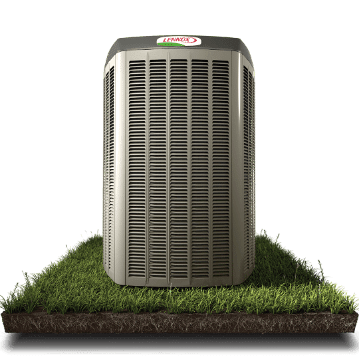Furnaces are still by far the most common way to heat homes in the United States, and recent innovations have made these systems more energy efficient than ever. Heat pumps are technically the most efficient home heating technology available. They have the added advantage of being able to both heat and cool a home, and heat pumps are becoming increasingly more prevalent in the U.S. as recent advancements have made them more suitable to colder environments.
Types of Furnaces and Heat Pumps
When comparing furnaces and heat pumps, there are six broad categories to consider:
- Electric furnaces
- Fuel-fired furnaces
- Air-source heat pumps
- Ground-source heat pumps
- Hybrid heating systems
- Ductless mini-split systems
Electric Furnace
Electric furnaces have an electric starter and use an electric heating element to warm the air. When it comes to furnaces, electric units are generally the most affordable to purchase and install. They have a long lifespan—upward of 30 years—are simple to operate and maintain and do not emit dangerous byproducts. On the downside, they tend to cost more than other furnace types to operate on a month-to-month basis, do not function during power failures and emit dry heat.
Natural Gas, Heating Oil and Propane Furnaces
Fuel-burning furnaces cost less to operate than electric units on a month-to-month basis. They also provide heat faster and deliver warmer and cozier heat. On the downside, they cost more to purchase and install, typically don’t last as long as electric furnaces, emit carbon dioxide and have the potential to emit carbon monoxide. There are several types of fuel-burning furnaces. Natural gas furnaces are most prevalent as natural gas is affordable and is clean-burning. Heating oil actually provides a hotter heat and is a popular alternative in neighborhoods that do not have access to a natural gas line. Propane is an alternative to heating oil, and which is best for you between those two depends on regional pricing.
Air-Source Heat Pump
Heat pumps are electric systems that operate by transferring heat energy to and from a particular medium. Air-source heat pumps—meaning that they transfer energy to and from the ambient air—are the most common and generally what is meant when the term heat pump is used. A heat pump can both heat and cool a home. In fact, a heat pump is a lot like an air conditioner except that it can essentially operate in reverse. Heat pumps are highly efficient. They eliminate the need to have a furnace and air conditioner. However, heat pumps are less efficient at lower temperatures. They are therefore not suitable for all U.S. climates, but the technology is evolving rapidly in that regard.
Air-Source Heat Pump With Auxiliary Heat
One way to overcome the shortcomings associated with a heat pump is through what is called hybrid heating. In such a system, you have a heat pump that cools the home and warms it most of the time. But when the temperature drops to a point where the heat pump is no longer efficient, an auxiliary heating system—often a fuel-burning furnace—kicks in to take over the heating duties.
Ground-Source Heat Pump
Often referred to as geothermal heating, a ground-source heat pump transfers energy to and from the earth or a large body of water. This approach does not have the limitations of an air-sourced approach. But geo heating is not yet prevalent, which is due to them still being relatively expensive to install.
Mini-Split
A mini-split functions similarly to an air-source heat pump. The main difference is that a mini-split is not connected to a centralized duct system. Instead, it blows warmed and cooled air directly into the living space. Mini-splits are an attractive option for older homes that do not have ductwork installed. They are also an effective option for home additions and have become an increasingly popular option for newer homes as a way of implementing zoned HVAC systems.
Split vs. Packaged Systems
Most furnaces and heat pumps are split systems. A mini-split is called such because it is, in fact, a split system as well. In a split system, you have an indoor unit and an outdoor unit. This approach is generally preferred when practical because it is more efficient, requires less maintenance and has a longer expected lifespan. Nevertheless, the construction of your home may be such that you do not have the room for an indoor unit, and a packaged system is an alternative because it comprises all necessary components within a singular outdoor unit.
Gas and Oil Heat Feel Warmer
While this may change in the future, most homeowners still prefer a fuel-burning furnace when given the option. It provides what many people consider to be the coziest heat. Fuel furnaces do cost more to purchase and install, but the month-to-month costs are lower and the total cost of ownership is typically lower as well—at least compared to the traditional furnace and air conditioner pairings.
Natural Gas vs. Heating Oil and Propane
If you prefer a fuel-burning furnace and have access to natural gas, it is the preferred option as it is cheaper and cleaner. However, if you do not have access to natural gas, heating oil and propane are both viable options, and you should go with whichever one is priced lower in your region.
Natural Gas vs. Electric
The difference in long-term costs between fuel-burning and electric furnaces are shrinking. It is best to do an estimate over the projected life of the equipment based on regional pricing. Although gas heat does feel warmer, this is generally only an issue when it is blowing on you. Most people acclimate to electric heat just find, and you can use humidifiers to overcome the drier air.
The Heat Pump Advantage
A heat pump is generally considered to be the most energy-efficient option available. It will cost less to purchase and install than a furnace and air conditioner. It will cost less to run on a month-to-month basis over the course of a year. It will also have a lower total cost of ownership.
If you live in a climate that has very cold nighttime temperatures and are interested in a heat pump, you absolutely should consider a hybrid heating system. It will cost more upfront, but it provides you the best of both worlds. You get to enjoy the energy savings of a heat pump during most of the year, and when very cold temperatures strike, your fuel-burning furnace will kick on to keep you warm.
Your Local Home Heating Experts in Northern California
Environmental Heating & Air Solutions has home offices in Benicia and Roseville and provides our services throughout Northern California. If you’re considering a new furnace or heat pump, we’d be happy to help you determine which system is ideal for you and your home. Our company provides installation, maintenance and repair services for heating systems, cooling systems and indoor air quality equipment. We also offer a full range of plumbing, insulation and home automation services. Call us today or contact us online to schedule an appointment or to learn more about our services.

